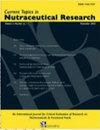Comparison of Efficacy of Amoxicillin/Clavulanate Potassium and Azithromycin Sequential Therapies on Nutritional Status of Children with Bronchopneumonia
IF 0.4
4区 医学
Q4 NUTRITION & DIETETICS
Current Topics in Nutraceutical Research
Pub Date : 2024-01-07
DOI:10.37290/ctnr2641-452x.22:466-472
引用次数: 0
Abstract
Bronchopneumonia is a highly prevalent respiratory disease among malnourished children and infants, and it is mainly treated with antibiotics. Herein, we compared the efficacy of amoxicillin/clavulanate potassium and azithromycin sequential therapies for bronchopneumonia. We found that amoxicillin/clavulanate potassium had improved clinical efficacy and accelerated rehabilitation in patients with bronchopneumonia. Azithromycin demonstrated superior efficacy in inhibiting inflammation, enhancing nutritional status, and regulating trace element levels. The therapeutic safety profile of the two sequential therapies was broadly consistent. In the treatment of bronchopneumonia, azithromycin and amoxicillin/clavulanate potassium have their advantages and disadvantages. Therefore, the drug selection for children should be based on their specific conditions.阿莫西林/克拉维酸钾和阿奇霉素序贯疗法对支气管肺炎患儿营养状况的疗效比较
支气管肺炎是营养不良儿童和婴儿中的高发呼吸道疾病,主要采用抗生素治疗。在此,我们比较了阿莫西林/克拉维酸钾和阿奇霉素序贯疗法治疗支气管肺炎的疗效。我们发现,阿莫西林/克拉维酸钾可提高支气管肺炎患者的临床疗效并加快康复。阿奇霉素在抑制炎症、改善营养状况和调节微量元素水平方面的疗效更佳。两种连续疗法的治疗安全性基本一致。在支气管肺炎的治疗中,阿奇霉素和阿莫西林/克拉维酸钾各有优缺点。因此,应根据儿童的具体情况选择药物。
本文章由计算机程序翻译,如有差异,请以英文原文为准。
求助全文
约1分钟内获得全文
求助全文
来源期刊
CiteScore
1.10
自引率
0.00%
发文量
36
审稿时长
>12 weeks
期刊介绍:
Current Topics in Nutraceutical Research is an international, interdisciplinary broad-based peer reviewed scientific journal for critical evaluation of research on chemistry, biology and therapeutic applications of nutraceuticals and functional foods. The major goal of this journal is to provide peer reviewed unbiased scientific data to the decision makers in the nutraceutical and food industry to help make informed choices about development of new products.
To this end, the journal will publish two types of review articles. First, a review of preclinical research data coming largely from animal, cell culture and other experimental models. Such data will provide basis for future product development and/or human research initiatives. Second, a critical evaluation of current human experimental data to help market and deliver the product for medically proven use. This journal will also serve as a forum for nutritionists, internists, neurologists, psychiatrists, and all those interested in preventive medicine.
The common denominator of all of the topic to be covered by the journal must include nutraceuticals and/functional food. The following is an example of some specific areas that may be of interest to the journal. i) Role of vitamins, minerals, antioxidants and phytonutrients on cardiovascular health, cancer, diabetes, ocular health, mental health, men’s health, women’s health, infant nutrition, ii) Role of herbals on human health, iii) Dietary supplements and sleep, iv) Components of diet that may have beneficial effect on human health, v) regulation of apoptosis and cell viability, vi) Isolation and characterization of bioactive components from functional foods, vii) Nutritional genomics, and viii) Nutritional proteomics.

 求助内容:
求助内容: 应助结果提醒方式:
应助结果提醒方式:


